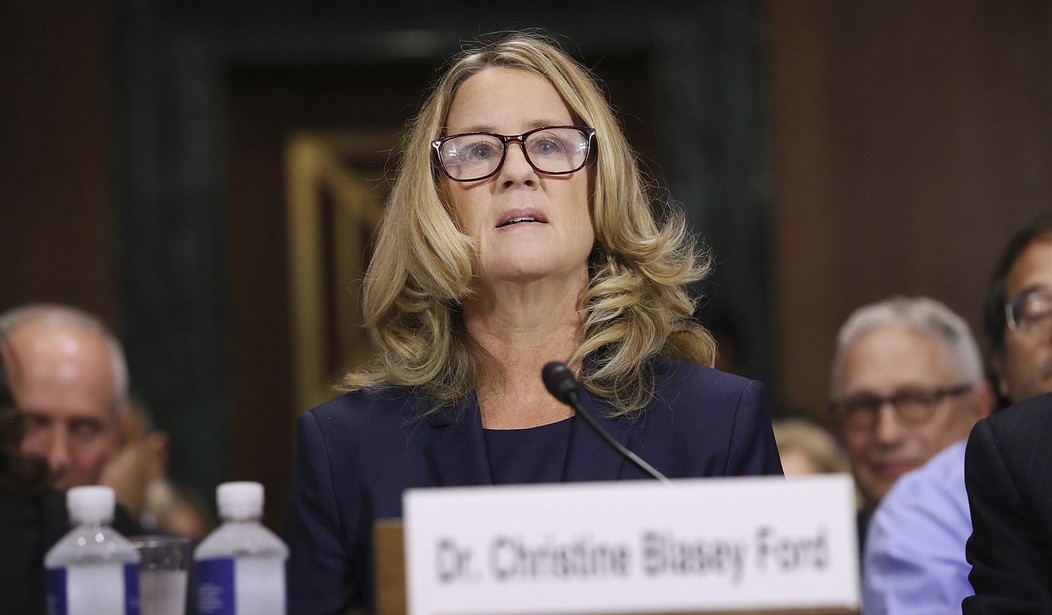Karl Marx, commenting on the ascension of Louis Napoleon, wrote, "History repeats itself: The first time as tragedy, the second time as farce." The drama over Brett Kavanaugh's confirmation has reversed the order. It began as farce. Protesters dressed in "The Handmaid's Tale" red capes lined the halls of senate office buildings. Senator Kamala Harris behaved like a heckler at her own committee's hearing. Senator Cory Booker invited martyrdom by claiming to break a rule that he didn't actually violate. The Democratic senators demanded documents that might have passed over Kavanaugh's desk in the Bush administration despite the fact that they had already announced their intention to vote against him. (Senators Amy Klobuchar and Chris Coons clearly didn't get the memo and conducted themselves as if they were actually seeking insight into Kavanaugh's views of the judiciary.)
Then it descended into tragedy. Senator Dianne Feinstein, at the 11th hour, announced that she had referred an anonymous accusation to the FBI. She had been in possession of the information since July but held it. As Gregg Nunziata, former chief nominations counsel to the Senate Judiciary Committee outlined in The Weekly Standard, such accusations are common. Procedures are in place to investigate them confidentially, sometimes involving the FBI, sometimes not. But this one was treated as an ace in the hole. Its existence was strategically leaked when it could do the maximum damage.
After someone on the committee leaked Christine Blasey Ford's identity, the real show trial -- the one conducted in the media -- got rolling. Story after story appeared about women and girls who'd been attacked or abused and kept silent. The Atlantic ran a piece by Caitlin Flanagan subtitled, "When I was in high school, I faced my own Brett Kavanaugh." Prejudicial, you think?
The New Yorker account of an incident at Yale seemed not so much reported as extracted with forceps. Deborah Ramirez's memory of the alleged event was so hazy that she consulted classmates about whether they recalled it, and took six days to think over whether it was Kavanaugh or someone else. The Julie Swetnick story of rape trains seems literally incredible.
Recommended
Dozens of retrospectives of the Anita Hill hearings have been lovingly presented, with agonized commentary suggesting that if Kavanaugh is confirmed it will be a verdict on whether our nation has changed since the 1990s. Left-leaning outlets basically decreed Kavanaugh guilty due to his skin color and background. USA Today said "prep school elites take care of their own." Salon fumed about "class, social capital, and endless privilege," and Vox filled us in on how elite schools "enable toxic masculinity."
The stampede to judgment was reminiscent of the Duke lacrosse case and the Rolling Stone "rape on campus" story. In both instances, the accused were deemed guilty of being white and privileged and therefore presumed guilty of far worse. It's the mirror image of presumptions of guilt that often attach to African-American men. It all depends upon who is doing the presuming. If you're generally hostile to white men, or nurture grievances about class privilege, you throw the presumption of innocence out the window. Similarly, if you're afraid of black people, it's hard to remember that, high crime statistics notwithstanding, the majority of black men are law-abiding. In any case, whatever observations we make about a group -- and some are correct as generalizations, for example, women are less likely to be sexual predators than men -- it is always unjust to judge an individual because of his membership in a group.
Another often-repeated theme is that in the past "women were not believed," and accordingly justice demands that we believe them now. Well, it's certainly true that women used to be impeached in rape cases when lawyers would use their sexual histories against them. Rape shield laws put an end to that. But the issue is more complicated than the slogan suggests. Rape and sexual assault cases are difficult because they almost always involve a crime that happens in private. The consequences of a guilty finding are so severe that every attempt has to be made to test the victim's account.
Which brings us to the dueling stories presented Thursday. Dr. Christine Blasey Ford seemed honest and reliable. Judge Kavanaugh seemed equally so, as well as understandably outraged at what he called the "search and destroy" nature of this process. How are outsiders expected to judge where the truth lies? Shall we believe the woman because she's a woman?
I don't know who's lying, if anyone is. But I do know that this carnival has had little to do with truth.

























Join the conversation as a VIP Member